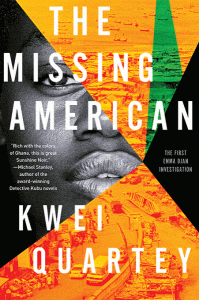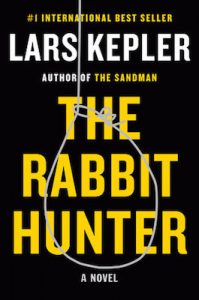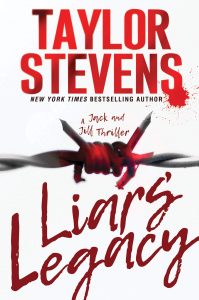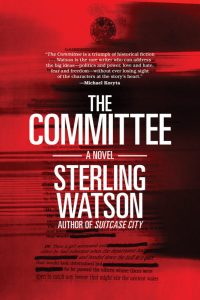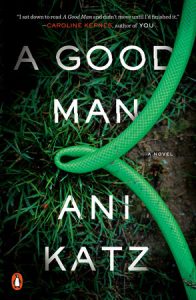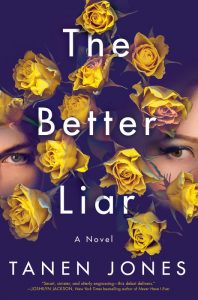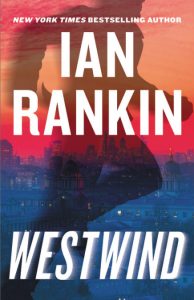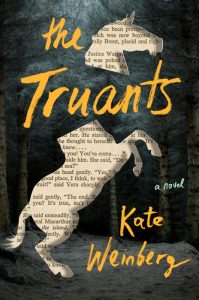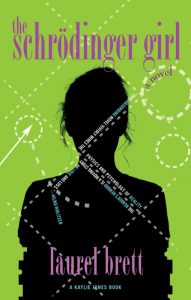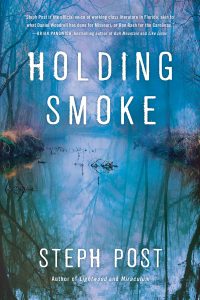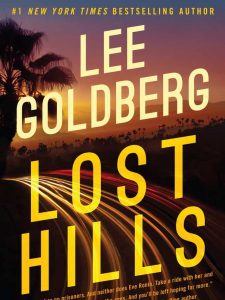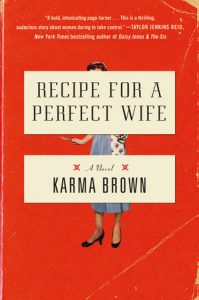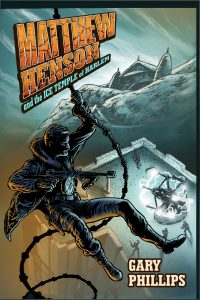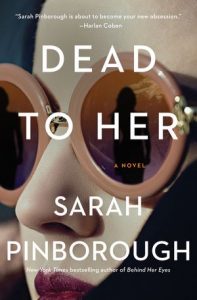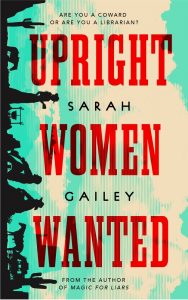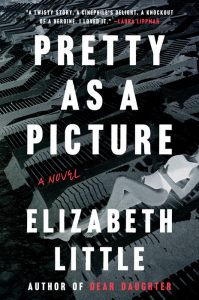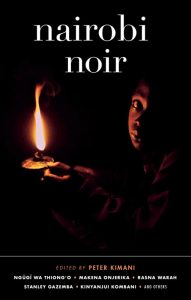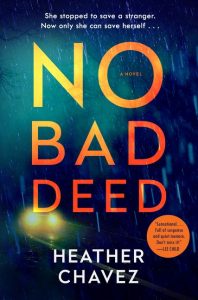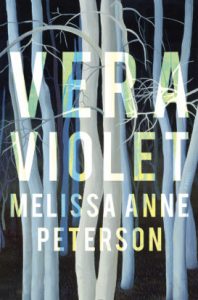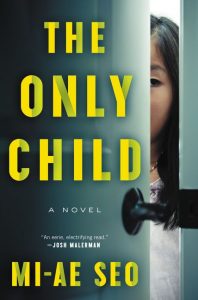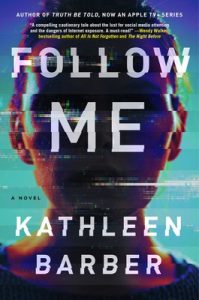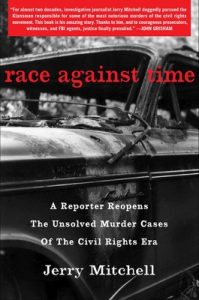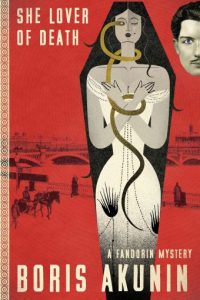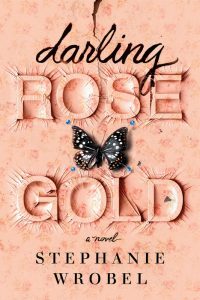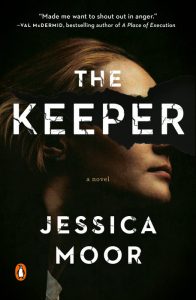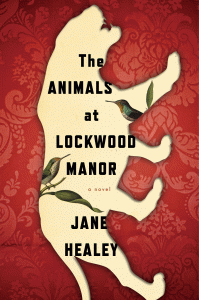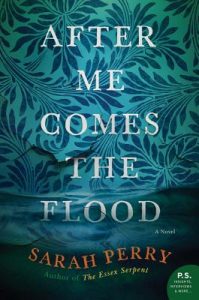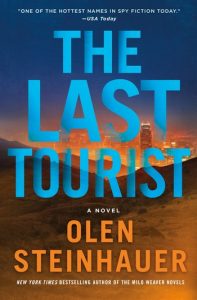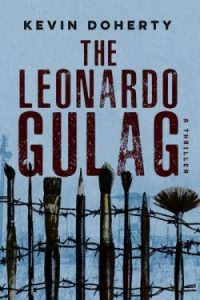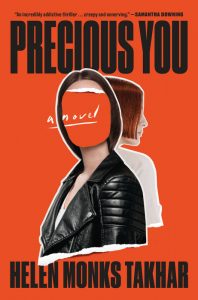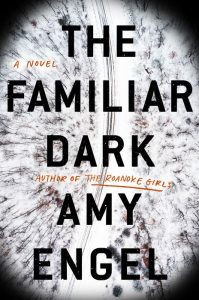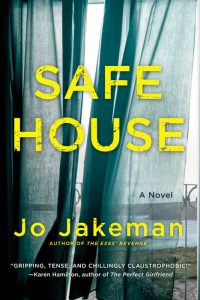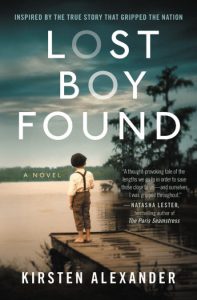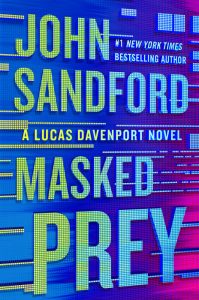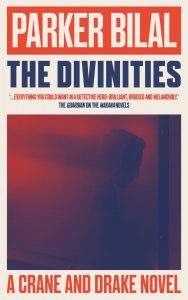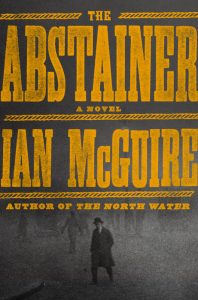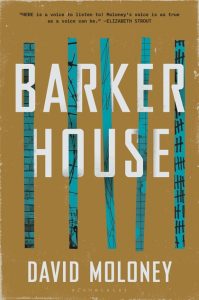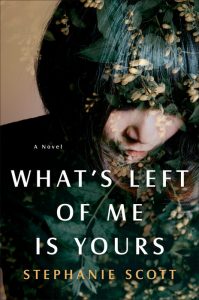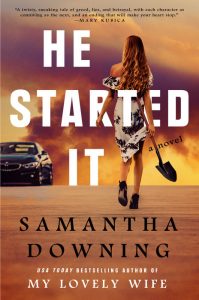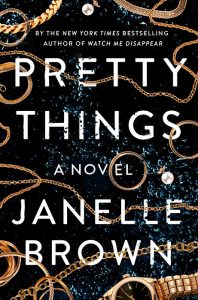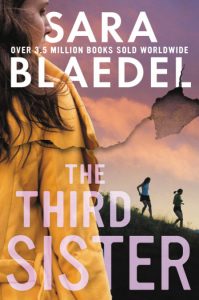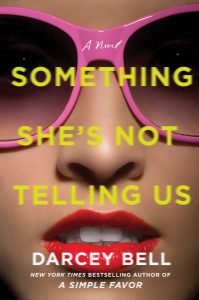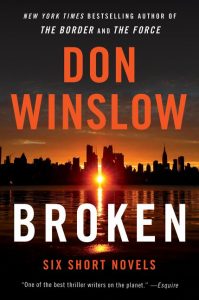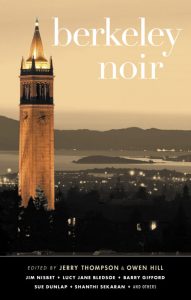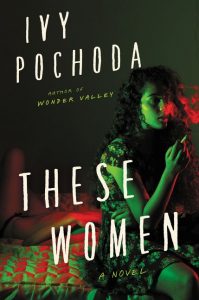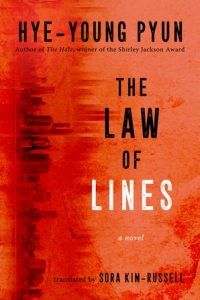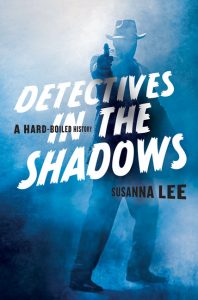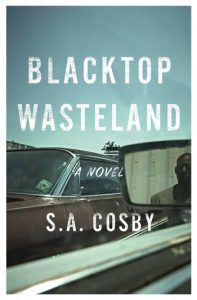ivAs a new decade dawns, it’s time to bring you our biggest preview ever! From new voices to old favorites, series to standalones, lush gothics to minimalist noirs, contemporary thrillers to historical mysteries, and of course, psychological thrillers galore, we’re rounding up the year’s most anticipated crime books. Below, you’ll find at least 125 crime and mystery releases coming out in the first half of the year (we do books here, okay? not numbers), and keep an eye out in May for Part II: More Books, More Blurbs!
Crime fiction is a big tent, but CrimeReads is a small office, so the selections below will lean toward those parts of the genre the CrimeReads editors know best. If you see something missing from the list that should be on here, put it in the comments!
January
Kwei Quartey, The Missing American (Soho)
Ghanaian-American writer Kwei Quartey is taking a break from his critically acclaimed Darko Dawson novels to launch a new series featuring Emma Djan, a private investigator, who’s first big case involves internet scams, magic rituals, and of course, the titular Missing American. Emma is a winning new series lead, backed up by a cast of quirky side characters. While I’ve enjoyed the Darko Dawson novels, I adore the plucky protagonist of The Missing American, and I can’t wait to see what Emma Djan does next!—Molly Odintz, CrimeReads associate editor
Lars Kepler, The Rabbit Hunter (Knopf)
“Ten little rabbits all dressed in white/Tried to get to heaven on the end of a kite./Kite string got broken, down they all fell/Instead of going to heaven, they all went to…” The nursery rhyme repeated in this sixth Joona Linda book is terrifying enough to give us nightmares—but in a good way.—Lisa Levy, CrimeReads contributing editor
Tiffany Tsao, The Majesties (Atria)
Tiffany Tsao’s visceral debut is filled with rage, and reads a bit like Crazy Rich Asians if the book began with familicide instead of romance—within the first few pages, a woman wakes up in the hospital to discover her entire family has been poisoned by her sister. The Majesties then flashes back to tell the stories of two sisters, the protected daughters of a super-wealthy clan of Indonesian-Chinese tycoons, as they struggle to find happiness, and grow increasingly bitter with their lot in life, and disappointed in those around them. Why not start off the new year with the perfect tear-it-all-down read?—MO
Joe Ide, Hi Five (Mulholland)
It’s always a good time checking in on Isaiah Quintabe, Ide’s genius detective of the people. This time, he’s tasked with finding an heiress—but there’s a twist. She has five distinct personalities, and each one knows something Isaiah will need to solve the crime.—LL
Louisa Luna, The Janes (Doubleday)
Luna’s compelling PI Alex Vega and her partner Max Caplan return, and this time, they’re investigating the murders of two young women. The case takes them into the shadowy world of human trafficking and the sex trade, as the two work to not only find the murderer but also do what they can to restore humanity to the victims. Luna’s thrilling novels have established her as a powerful up-and-coming voice in the genre, and we can’t wait to see what she does next.—MO
Taylor Stevens, Liar’s Legacy (Kensington)
In this next installment of Taylor Stevens’ gripping series about twin assassins Jack and Jill, the siblings are about to head to Berlin to meet their long-lost father, but it’s not long before they suspect they’ve fallen into a trap. They’ll have to navigate a conspiracy led by a Russian organization desperate to recruit them, plus some American assassins sent to terminate them, and ultimately, they’ll have to navigate being pitted against each other.—Olivia Rutigliano, CrimeReads editorial fellow
Benjamin Black, The Secret Guests (Henry Holt)
Benjamin Black is the pen name of renowned Irish writer John Banville, who uses the pseudonym for his carefully wrought detective fiction. His latest mystery is a departure from his usual elegantly noir style, taking place during WWII, when the British royal children were sent away from the Blitz and stashed on a remote estate in neutral Ireland. Espionage fiction, manor house gothic, and locked room mysteries collide for what’s bound to be one of the best historicals of the year.—MO
Gregg Hurwitz, Into the Fire (Minotaur)
Gregg Hurwitz’s Orphan X series, featuring Evan Smoak, former assassin and secret weapon of the United States Government who has reinvented himself as a helper of the less fortunate called The Nowhere Man, is one of the most exciting around. In the fifth installment of, Smoak is back and ready to help another desperate person. This time, it’s Max Merriweather, a young man whose cousin has been horrifically murdered. The only clue about why this has happened is a mysterious key. But even Evan Smoak isn’t prepared for what this case will unlock.—OR
Chris Hauty, Deep State (Emily Bestler Books/Atria)
When the White House chief of staff is found dead in his home, everyone chalks it up to natural causes, but a curious intern in possession of a single clue isn’t quite so willing to let the matter go. Deep State is a perfect political thriller for our times, as characters battle over the rule of law and the future of democracy.—MO
Sterling Watson, The Committee (Akashic)
This academic mystery takes us into the depths of the Cold War, Florida edition, as a bunch of professors find themselves targeted by the mysterious Committee, dedicated to using law to control morality. As The Committee begins, a professor commits suicide, and a curious onlooker gets more than he bargained for when he opens his own investigation.—MO
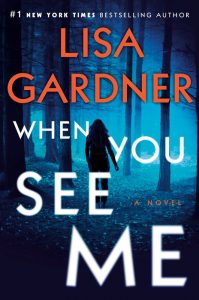
Lisa Gardner, When You See Me (Dutton)
Say what you will about the Lisas of crime fiction (Gardner, Lutz, Scottoline, Unger, Jewell, et al) but their books generally do not disappoint: each one knows how to hook a reader and tell a twisted story. In this outing Gardner brings back three of her most popular investigators—Detective D. D. Warren, Flora Dane, and Kimberly Quincy—and has them team up to investigate the crimes of the serial killer Jacob Ness.—LL
Christopher Bollen, A Beautiful Crime (Harper)
In Christopher Bollen’s wicked new novel of fugitives brought down by their own greed, a young man and his boyfriend take off for Venice with a plan to sell counterfeit antiques to a man they assume to be as ignorant as he is wealthy. Their scam devolves as quickly as one would expect, as one falls prey to the allures of Venice, and the other finds himself obsessing over long-ago traumas. Haunting, atmospheric, and enigmatic.—MO
Erica Spindler, The Look-Alike (St. Martin’s)
Erica Spindler’s new thriller is a terrifying story of a young woman who increasingly believes that she, not the victim, was the intended target of a murder that she witnessed many years ago. And not only this—but that the killer may be trying to finish the job now.—OR
Ani Katz, A Good Man (Penguin)
When a book comes out with a title like this one has, you know it’s going to be about someone truly terrible. I’ve often thought about crime fiction as the art of the excuse—a skilled crime writer knows how to both show a character’s bad behavior and demonstrate the justifications used by that character to excuse their behavior. In Katz’s mature and wicked debut, we encounter a man who’s slowly crumpling under the pressure of his mounting debts and need for perfection. He’s done something bad—but how bad is difficult to imagine. So, too, is the dark past that informs the actions of the present. Katz’s debut evokes Highsmith’s Ripley, or Denise Mina’s The Long Drop, and heralds the entry of a fantastic new voice to the genre.—MO
Tanen Jones, The Better Liar (Ballantine)
Tanen Jones’ debut joins a host of crime novels featuring women teaming up for nefarious ends, including Lisa Lutz’s The Passenger and Amy Gentry’s Last Woman Standing, and I’m delighted to see so much teamwork gracing the page of the feminist thriller (although of course, even the best partnerships can fall apart given the right stressors). After her father’s death, a young woman finds out she won’t inherit anything unless she can find her sister, estranged for over a decade. When she fails to track her errant family member down, she hires a drifter to impersonate her missing sister so as to be able to claim her inheritance. At first, the arrangement is working out for everyone—but both women have their own secrets to hide.—MO
Alex Marwood, The Poison Garden (Penguin)
Psychological suspense fave Marwood (The Wicked Girls, The Darkest Secret) tries her hand at that perennial crime fiction favorite, the cult novel. Marwood’s cult is called the Ark, and they live in an isolated part of Wales. The novel opens with a mass suicide of a hundred members. Our heroine, Romy, is a young, pregnant woman who has never lived outside the cult and has to fend for herself after the dissolution of the Ark.—LL
Ian Rankin, Westwind (Little Brown)
Originally published in 1990, this classic espionage novel about political tensions between the United States and Great Britain is back in print in a striking new edition. As America pulls troops out of Europe in a move towards isolationism, a space shuttle crashes to earth, landing in America and leaving only one survivor, a British citizen, who is immediately lambasted by the press. Amid these increasingly tense events, Martin Hepton, working at English ground control, notes with horror that his team has lost contact with a crucial satellite. And then his colleague, who suspects that something sinister is afoot, vanishes, leaving him to put all the pieces together.—OR

Luke Geddes, Heart of Junk (Simon & Schuster)
At last! The crime fiction refutation of Marie Kondo’s minimalist philosophy we’ve all been waiting for. When an antiques television show plans a visit to a small town currently freaking out about a missing pageant princess, surprising connections will come to the fore, and any of us who still cling to the remnants of the past will feel like maybe someday we can use whatever is in the attic to solve a crime. Also, there are record collectors!—MO
Scarlett Thomas, Oligarchy (Counterpoint)
In a private all-girls school, students compete to be the thinnest, and new student Natasha, the daughter of a Russian oligarch, isn’t about to be left behind. But when her best friend vanishes, Natasha soon discovers the school is hiding much more than a penchant for eating disorders.—MO
Joseph Finder, House on Fire (Dutton)
Finder’s latest follows private investigator Nick Heller, whose specialty is exposing the secrets of the wealthy and powerful, as he agrees to help a billionaire family’s estranged scion blow the whistle on her family’s pharmaceutical company. Centered on timely issues, but grounded in the craft of detective fiction, House on Fire promises to be one of the year’s best.
Sulari Gentil, Give the Devil His Due (Poisoned Pen)
The artist Rowland Sinclair is back in his seventh mystery in this beloved series from Australia. When he’s invited to drive his iconic yellow Mercedes along the Maroubra Speedway in a race against various celebrated drivers (including Errol Flynn, riding in his adored silver Triumph), Rowland only thinks he’s embarking on another fun adventure. But when the event starts claiming lives, he begins to wonder—are the tragedies caused by the natural dangers of the road, dangers which have caused it to be nicknamed the ‘Killer Track,’ or is there something else afoot?—OR
C.J. Tudor, The Other People (Ballantine Books)
Only three novels into her career, Tudor has already carved out a space as a master of mixing gothic suspense with psycho-noir, and her new novel, The Other People, promises to carry on in the same tradition. Gabe, a grieving father, is the only one who believes his missing daughter is still alive—at least, until he finds himself initiated into a shadowy organization of others who will do anything to discover what has happened to the ones they love.—MO
Kate Weinberg, The Truants (Putnam)
Kate Weinberg is obsessed with Agatha Christie’s mysterious disappearance in 1926, and in The Truants, her characters are, too; Weinberg’s debut follows a brilliant young student as she embarks upon an intense academic exchange with a badly behaved Agatha Christie scholar. Perfect for fans of psychological thrillers and traditional mysteries alike!—MO
Liz Moore, Long Bright River (Riverhead)
In Moore’s hefty novel two sisters who have gone down divergent paths—Mickey is a cop, Kacey a junkie and petty criminal—come to an impasse. After years of trying to save her sister Mickey finally puts some distance between them and she marvels at how different she feels. But her salad days are not long-lived: Kacey disappears, and Mickey’s savior complex kicks in again. Moore does a good job of creating the setting of Philadelphia, and has a kind of empathy for her characters that makes you root for them.—LL
Laurel Brett, The Schrodinger Girl (Akashic)
In this mind-bending experimental thriller, an uptight scientist being dragged kicking and screaming into the 1960s is as depressed as he is bored—at least, until he meets a mysterious woman he becomes obsessed with, who then splinters into four different versions of herself, each with their own take on the scientist’s intentions.—MO
Steph Post, Holding Smoke (Polis)
In this thrilling conclusion to Post’s acclaimed Judah Cannon trilogy, there’s a showdown coming between Judah and his arch-enemy, the Pentacostal priest responsible for his father’s death. An alliance with the crime matriarch from across the creek may be more trouble than it’s worth, and add in a few swampland schemes and you’ve got the making of a modern Florida noir classic.—MO
Lee Goldberg, Lost Hills (T&M)
Lee Goldberg’s brassy thrillers are exactly the stories that LA county needs, and his latest promises to be just as star-studded and action-packed. When a cop’s off-duty arrest of an abusive film star goes viral, she gets a surprise promotion to homicide, where she’s got a lot to prove—and soon takes on the perfect case to prove it. This book came out the first of January, just as we’re all dreaming of a visit to warm Southern California…
William Gibson, Agency (Berkley)
In William Gibson’s follow-up to The Peripheral, the inventor of cyberpunk has a harrowing new tale of apps gone awry. In the present day, a app-whisperer works to design a personal assistant with some surprising combat skills. 100 years in the future, powerful figures attempt to change the path of history, and perhaps avert an apocalypse.
Katrine Engberg, The Tenant (Gallery/Scout)
While there are plenty of messed-up power dynamics out there in crime fiction, I have yet to come across any murderous relationships between landlady and tenant—at least, until now. When a young woman turns up murdered in her own apartment, suspicion quickly falls upon her hard-partying landlady and her circle of decadent artist friends, especially when police find that the landlady has been writing a murder mystery in which the victim shares more than a few things in common with the real-life corpse.—MO
Emma Copley Eisenberg, The Third Rainbow Girl (Hachette)
Two young women, Vicki Durian, 26, and Nancy Santomero, 19, were murdered on June 25, 1980 in Pocahontas County, West Virginia. Three girls were on their way to a gathering called the Rainbow Festival, and two were murdered en route. What happened to the third? Emma Copley Eisenberg was living in West Virginia when she first came across the story of the murders, and her time spent in the state helps get the texture and nuance right. The result is dazzling.—LL

Renee Patrick, Script for Scandal (Severn House)
Renee Patrick’s charming Old Hollywood whodunnits, featuring aspiring actress Lillian Frost and real-life costume designer Edith Head as a pair of amateur sleuths, combine glamour, research, and edge. The third in the series, Script for Scandal, promises to be just as good as the first two, as Lillian and new policeman beau investigate a bank robbery with potential ties to a Hollywood scandal.—MO
Karma Brown, Recipe for a Perfect Wife (Dutton)
I’m fond of the trope in popular culture where people switch identities, or you see an alternate path for a character (a la Sliding Doors) if she had made different choices. Brown’s novel is a riff on this: it centers around Alice Hale, who has left her career in publicity to be a writer and live in the suburbs at her husband’s behest. Alice finds a cookbook from an earlier woman of the house and starts using it and getting obsessed with her 1950s predecessor, to the point where her precursor’s secrets could put her in danger.—LL
February
Gary Phillips, Matthew Henson and the Ice Temple of Harlem (Agora)
Gary Phillips has been pulpifying crime fiction since he first came onto the scene, and each of his works is a joyful celebration of long-invented forms awaiting rediscovery and to be reshaped for the modern world. With Matthew Henson and the Ice Temple of Harlem, Phillips takes real life arctic explorer Matthew Henson and sticks him in 1920s Harlem, investigating crimes and encountering many a Harlem Renaissance figure. In Phillips’ latest, he not only does justice to a long-erased history of African-American adventurers, but also brings to life a unique moment in time.—MO
Paul Vidich, The Coldest Warrior (Pegasus)
The title does double duty here—Vidich’s latest is about a cold case investigation during the Cold War, split between the 1950s and the 1970s. In 1953, a CIA scientist’s death from falling is quietly labeled as suicide; two decades later, a friend of the family reopens the case after learning that his old comrade’s demise may have been linked to experiments in psychedelic drugs. A richly detailed work of investigative crime writing perfect for fans of procedurals and spy fiction alike.
Kathleen Kent, The Burn (Mulholland)
Kent’s Dallas-based series continues as Detective Betty Rhyzyk deals with personal and professional fallout from her encounter with an apocalyptic cult. Her marriage is on the rocks, her patrol partner’s in bad shape and getting worse, and she’s stuck on a desk assignment that leaves her with too much time to think. So it’s no wonder that she decides to go rogue and hunt down a killer…
Yrsa Sigurdardottir, The Absolution (Minotaur)
The Icelandic police are horrified to find out about a horrific murder from a video on Snapchat—of a teenage girl screaming for forgiveness. When her body is found later on, it has been marked with a number “2.” Detective Huldar is assigned to the case, and brings along his colleague Freyja, a child psychologist who might be able to learn information from the victim’s friends. Soon they discover that the victim had a dark side, but when a body marked with a “3” shows up, and more horrifying content appears on social media, they know they don’t have long to figure out the pattern before the body count grows. But first they need to find whoever wears the “1.”—OR
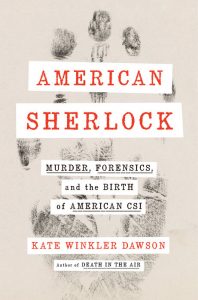
True Crime Spotlight
Kate Winkler Dawson, American Sherlock (Putnam)
I was blown away by Kate Winkler-Dawson’s Death in the Air, a true crime account of two serial killers: one, an ordinary man, and the other, London’s deadly smog. Her new novel promises to *ahem* make you gasp in a whole other way, as she takes us to 1933 Berkeley, California, where Edward Oscar Heinrich, or “the American Sherlock,” is quietly plugging away at a new discipline: that of forensic science. Part institutional history, part true crime account, and part dramatic tale of brilliant minds and clashing personalities, The American Sherlock promises to be just as gripping as her first.—MO
Walter Mosley, Trouble Is What I Do (Mulholland)
While Mosley is best known for his Easy Rawlins series, I’ve always been partial to his Leonid McGill series, featuring a morally ambiguous protagonist who protects his family before all else, even as the various members of his extended clan drive him to distraction. Leonid’s new task is irresistible: he’s to inform a prominent white family of their many black relatives, upon the request of an elderly Mississippi bluesman.—MO
Sarah Pinborough, Dead to Her (William Morrow)
Pinborough is a dazzling magician of a novelist, a sleight-of-hand artist who gets better with every book. In this one, which is much steamier than her earlier works (if you like a little sex with your crimes), a trophy wife and her insecure husband are both smitten with the woman his boss has married on a whim in London and brought back to stir up trouble in their comfortable world of wealth and privilege.—LL
Scott Carson, The Chill
I’ve always said, you can’t trust lakes. What are they hiding?!?! In this horror thriller set in upstate New York’s old-growth forests, where a dam once drowned a Cherokee village in the name of progress, we’re about to find out. So many communities were moved during the nation’s great dam-building era, and so many rivers stunted and drained, that it’s high time some angry spirits emerged from beneath the waters to take their vengeance.
Jonathan Kellerman, The Museum of Desire (Ballantine)
Jonathan Kellerman’s psychological thrillers featuring detective Milo Sturgis and psychologist Alex Delaware are as twisted as they are satisfying, and The Museum of Desire promises to be the most thrilling yet! When victims of a bizarre killing spree are discovered in a stretch limousine, arranged in creative and horrific poses, it’s up to Delaware to dive into the psychology of a murderer, and up to Sturgis to track them down.
Sarah Gailey, Upright Women Wanted (Tor.com)
Sarah Gailey impressed us all with their debut Magic for Liars, a queer-romance-meets-murder-mystery-investigation set inside a magic school, and their followup promises to be just as genre-bending. In Upright Women Wanted, Gailey creates a neo-Western adventure set in the near future, in which gunslinger librarians fight post-apocalyptic fascists, which sounds both politically responsible and incredibly fun.—MO
Meg Gardiner, The Dark Corners of the Night (Blackstone)
Gardiner’s UNSUB novels, featuring FBI profiler Caitlin Hendrix, have become one of my go-to series (this is the third book). If you’re looking for a Criminal Minds fix or missing the initial thrill of Thomas Harris, I would urge you to seek Gardiner out. In this book, the serial killer is known as the Midnight Man, and he kills parents while the children watch.—LL
Elizabeth Little, Pretty as a Picture (Viking)
Little’s first book since the excellent 2014 Dear Daughter is a Hollywoood-set psychological thriller, a book to shelve with Megan Abbott’s The Song is You and Alison Gaylin’s What Remains of Me. Little cleverly taps into the history of female film editors and makes her own protagonist, Marissa Dahl, an editor on a film directed by the notorious Tony Rees. The logline? Some girl dies.—LL
Nairobi Noir, ed. Peter Kimani (Akashic)
Nairobi is a city of 3 million souls, so it makes sense as a setting Akashic Books’ famed noir series. 14 new stories fill a collection with Nairobi old and new; authors range in age from 24 to 81, and many layers of the city and its complex subcultures will be revealed as the reader makes their way through. Perfect for the armchair traveler!—MO
Mary Kubica, The Other Mrs. (Park Row)
Kubica is the queen of fertility noir (Pretty Baby, The Good Girl), but there are no babies or expectant mothers in this book. Sadie and Will Foust have just moved from Chicago to an island in Maine, lusting after a simpler life for their family. But things start to get complicated when their neighbor is found dead in her home, an event which shakes Sadie to her core. But why? Is Sadie hiding something that could ruin their fresh start?—LL
Gytha Lodge, Watching from the Dark (Random House)
In Gytha Lodge’s highly anticipated second novel, a man is Skyping with his artist girlfriend when he witnesses her being attacked, and yet fails to notify the police. Why was he so reluctant to help? Who would want to murder his universally well-liked girlfriend? And what were the two of them up to online?
Heather Chavez, No Bad Deed (William Morrow)
Like many a great crime novel, No Bad Deed asks an elemental question, the answer to which none of us can ever really know (until tested): would you help a stranger in need? And how long would you keep helping that stranger, if the act of assistance puts you in danger as well? As Chavez’s novel opens, an ordinary woman leaps to defend another woman being attacked on the side of the road. The attacker delivers a chilling promise: either let his intended victim go, or become a target herself.
Melissa Anne Peterson, Vera Violet (Counterpoint)
You know all of those articles about the beauty and the idyllic settings of the Pacific Northwest? If you are into that kind of thing, this is not the book for you. Rather, Peterson chronicles a group of friends in a dead-end logging town. Vera Violet is trying to make a better life for herself, but between the poverty and the drugs all around her she’s struggling. Self-improvement might be easier, she reasons, in a new place, so she takes off for St. Louis, Missouri. But the past follows closely, threatening to ruin any kind of better life she can establish for herself.—LL
Mi-ae Seo, The Only Child (Ecco)
While much of crime fiction features a parade of children in danger, what about those novels featuring children who are the danger? For those looking to be terrified by sociopathic youths, or those just looking for an all-around nailbiter of a thriller, we recommend The Only Child, in which a behavioral psychologist who studies serial killers becomes the caretaker of a very, very, creepy little girl.—MO
Massimo Carlotto, Blues for Outlaw Hearts and Old Whores (Europa)
Originally published in Italy in 2017, and translated by Will Schutt, this new installment of the “Alligator” series begins when ex-con and private eye Marco Buratti, aka “the Alligator,” falls into a trap laid by his nemesis. He and his partners, Max the Memory and Beniamino Rossini, are blackmailed and framed as they begin to investigate what is afoot—and they don’t have long to untangle the many knots fettering them before they are ensnared for good.—OR
Clare Beams, The Illness Lesson (Doubleday)
Clare Beams’ glorious new gothic mystery is a must-read for all fans of historicals and suspense. In the late 19th century, a man and his daughter leave their failed utopian community and set off to found a school for girls that will embrace rational methods of modern education. Instead, all the students become mysteriously ill. Is the plague tied to the flock of rare birds that mysteriously appeared over the school? Omens must indicate something, but exactly what will keep us guessing through the whole novel.—MO
Kathleen Barber, Follow Me (Gallery)
Like a lot of young women, Audrey Miller is obsessed with her Instagram feed. Getting the content and the filters just right is one of her great preoccupations. Her social media fixation serves her well in her job at the Smithsonian, where she is put in charge of spreading the word about the museum’s exhibitions. But things are troubling Audrey—first, there’s her creepy neighbor. Then there’s her ex, who won’t leave her alone, and the sudden appearance of one of her sorority sisters. Barber has a knack for exploiting very contemporary variations of paranoia: is someone following Audrey with the intention of harming her, or are they just into her presets?—LL
S.L. McInnis, Framed (Grand Central Publishing)
In this music-themed psychological thriller, a former piano prodigy beset by marital and financial difficulties is on a collision course with a jazz singer on a downward spiral. The two old friends have plenty of secrets to hide, both from the world, and from each other. What will happen when the truth comes out (and what soundtrack will be playing in the background when that happens)?
Lori Rader-Day, The Lucky One (William Morrow)
In Lori Rader-Day’s new mystery, The Lucky One, protagonist Alice has never quite gotten over her mysterious childhood abduction, despite being found less than 24 hours into her captivity. Decades later, Alice volunteers for an online group in support of those missing loved ones, only to find the face of her captor appear on screen. The Lucky One promises to be another signature Lori Rader-Day blend of psychology, suspense, and noir.—MO
Simone St. James, The Sun Down Motel (Berkley)
Like aunt, like niece? When Carly Kirk takes a job as a night clerk at the Sun Down Motel in 2017, she is haunted by what happened to her aunt, Viv Delaney, who had the same job in 1982 and disappeared while was saving up for a move to New York City. Carly senses something isn’t right at the Sun Down, but by the time she starts to figure out what she’s enmeshed in the same mysteries that possessed her aunt.—LL
Silvia Moreno-Garcia, Untamed Shore (Agora)
Upstart imprint Agora is killing it with their list so far, and we can’t wait to dive into Untamed Shore, a Baja-set noir, featuring a young protagonist stuck in a fishing village who dreams of making her way to Hollywood. The arrival of three American tourists staying for the summer provides the young woman with some relief from her ennuie, but she soons misses her small town boredom when one of the Americans turns up dead, and the others rope her in as their alibi. Untamed Shore is an atmospheric treat from an author better known for her fantasy fiction, and ready to make a name for herself in crime.—MO
True Crime Spotlight
Jerry Mitchell, Race Against Time: A Reporter Reopens the Unsolved Murder Cases of the Civil Rights Era (Simon & Schuster)
Jerry Mitchell’s crucial book investigates the “Mississippi Burning” case, the 1964 murder of three civil rights workers at the hands of twenty klansmen, whose identities and guilt were widely known though they were not prosecuted for the crime. No one was charged with murder. And it took forty-one years for the guilty party to go to trial.—OR
True Crime Spotlight
Sierra Crane Murdoch, Yellow Bird: Oil, Murder, and a Woman’s Search for Justice in Indian Country (Random House)
This remarkable work of journalism chronicles the work of Lissa Yellow Bird, a Native American woman who was released from prison in 2009 to find that her home had been ravaged by an oil boom. When she learns that a young white oil worker has mysteriously disappeared, she begins an investigation into the shady interlopers who have invaded the landscape.—OR
Paul Wolfe, The Lost Diary of M (Harper)
Mary Pinchot Meyer was a fascinating figure. Married to a former CIA chief and lover and confident to JFK, Meyer was a trailblazing artist who experimented with mind-bending drugs, smoked pot with Kennedy in the White House, and was found mysteriously murdered soon after the JFK assassination. In this richly detailed work of historical fiction, Paul Wolfe reimagines the last days of Mary Pinchot Meyer, full of impossibly dull CIA get-togethers, sultry presidential sex scenes, and all the strangeness of of a politically conservative DC in the midst of a counterculture upheaval.—MO
Sophie Hannah, Perfect Little Children (William Morrow)
Hannah is a pro at psychological suspense, one of the best writers in the game right now (and for fun, she also has taken up Agatha Christie’s mantle to respectable reviews). In her new book Beth, a literal soccer mom, has to take her son to his game, which is dangerously close to where her former best friend, Flora, lives. On an impulse Beth drives to Flora’s house and is shocked by what she sees: Flora’s children, Thomas and Emily, look precisely like she remembers them. But it’s been 12 years since she has seen them or Flora. How can this be so?—LL
Chan Ho-Kei, Second Sister (Grove)
Chan Ho-Kei’s new social noir tackles the issue of digital bullying; Second Sister begins with the suicide of a schoolgirl, immediately deemed suspicious by her librarian older sister, who is determined to investigate. She recruits a hacker to assist, and the two track bullies through the digital realm as asides paint a complex portrait of Hong Kong.—MO
March
Jussi Adler-Olsen, Victim 2117 (Dutton)
The next installment in Adler-Olsen’s winning Department Q series delves into the backstory of one of the most interesting characters: Assad, an immigrant from the Middle East who rarely talks about his past. The Department is taxed with solving the cold case of victim 2117, a refugee who drowned in the Mediterranean Sea. But it’s not just Assad or Department Q who is riled up by this death. Alexander, an unstable teenager, sees this as the time to unleash his murderous plans. And Ghallib, an expert torturer who honed his skills under Saddam Hussein, is supposed to set a terrorist plot into motion after the death of 2117.—LL
Boris Akunin, She Lover of Death (Mysterious Press)
Each of Boris Akunin’s acclaimed historical mysteries featuring aristocratic Inspector Fandorin takes on a different set of crime fiction tropes and makes them Akunin’s own, and She Lover of Death promises to continue the series’ tradition, as we venture with Fandorin into a turn-of-the-century suicide cult run by poets. Fandorin infiltrates the group, hoping to protect Russian youths from throwing their lives away, but will he instead fall victim to the cult’s mysterious seances and their doom-laden instructions? Perfect for all those who remember how good Young Sherlock Holmes was!—MO

Kate Elizabeth Russell, My Dark Vanessa (William Morrow)
Kate Elizabeth Russell’s My Dark Vanessa is the fictional answer to Lolita we’ve all been waiting for. This disturbing and complex novel is told from the perspective of a young woman traumatized by a sexual relationship with her high school teacher. She wants to believe they were in love—but as flashbacks reveal, her delusion of romance is merely a bandaid tacked over the deep wounds of assault.—MO
TaraShea Nesbit, Beheld (Bloomsbury)
I’m a huge fan of historical crime fiction, especially those books that manage to tell a compelling story while still immersing the reader in the thoughts and opinions of the time. TaraShea Nesbit’s Beheld begins with a murder on American soil ten years after the arrival of the Mayflower. It’s the first murder to occur in the fledgling colony, and the crime has its roots in the rivalry between an Anglican family and their Puritan neighbors, made deadly by the arrival of an interloper.—MO
C.J. Box, Long Range (Putnam)
In Long Range, C.J. Box’s 20th installment in his acclaimed series featuring Wyoming game warden Joe Pickett, the wife of a judge is shot and killed from an incredible distance, and with a grizzly bear on a rampage and a new baby on the way, Joe’s got his hands full. We’re looking forward to another satisfying installment in Box’s beloved series.
Andrea Bartz, The Herd (Ballantine)
Her hard-hitting debut, The Lost Night, has made Andrea Bartz one to watch, and her second novel, The Herd, confirms her reputation. As The Herd begins, the glamorous owner of a feminist coworking startup vanishes on the eve of a big announcement about the company. It’s up to her not-so-faithful stooges to find out what’s going on, and uncover the dark secrets behind the founding of the company. As someone whose building was recently taken over by a WeWork and who now has to wait 10 minutes for the elevator, I can’t endorse this book enough.—MO
Stephanie Wrobel, Darling Rose Gold (Berkley)
To me, the best psychological suspense dissects and examines our most complex and intimate relationships—this can mean a romance or a marriage, but it also applies to the bond between mothers and daughters. In Wrobel’s debut she presents us with a mother and daughter we won’t soon forget. Patty Watts, the mother of Rose Gold Watts, has always told her daughter that she was terribly ill. She used a wheelchair and was in and out of the hospital. Turns out Patty was just an excellent liar who used her daughter to scam money from sympathetic people. Now Patty is getting out of jail, and Rose Gold has shockingly agreed to take her mother in—but Rose Gold is not her mother’s little girl anymore.—LL
Donna Leon, Trace Elements (Atlantic)
In Donna Leon’s latest, Commissario Guido Brunetti and his colleague Claudia Griffoni are called to a hospice to witness a patient’s dying words. She’s convinced her late husband’s death was no accident, and only manages to mutter a few phrases indicating a debt to a dangerous lender before expiring. It’s up to the Commissario to investigate, especially as he’s never been able to let an unsolved mystery go.—OR
K. Ferrari, Like Flies From Afar (FSG)
There’s a lot of jobs out that qualify you to write crime fiction, including occupations on both sides of the law or any job worked between the hours of 10 PM and 6 AM, but K. Ferrari’s backstory takes the cake. Ferrari started as a night shift subway cleaner while building a career as an internationally published author of noir fiction, and his new novel cements his growing reputation. Like Flies from Afar is both a condemnation and parody of wealth, featuring an Argentinean oligarch with a coke habit and a body in his trunk. The coke habit he owns; the body, he’s flummoxed by. Who put it there, and what do they want? He’s got 24 hours to figure it out in this taut masterpiece of modern noir.—MO
John Lawton, Hammer to Fall (Atlantic)
John Lawton’s mid-century spy novels channel much of the genius of le Carré, but are possessed of a droll humor all Lawton’s own. In his latest tale of espionage to feature beleaguered MI6 agent Joe Wilderness, Joe is stationed in a backwater near the Iron Curtain when he comes up with a hare-brained scheme to make a little extra cash smuggling some vodka over the border after a Soviet grain famine makes the populace desperate for some grog.—MO
Jason Pinter, Hide Away (Thomas and Mercer)
This one puts a literal meaning to the old adage, whatever doesn’t kill you, makes you stronger. Hide Away begins with Rachel, a seemingly ordinary suburban mom taking care of her two young children and trying to balance work and life. We soon discover that behind the normal facade lies a woman with dark secrets, and unusual survival skills. When her family is threatened by new investigations and old enemies, it’s time to drop the act and fight back.—MO
Jessica Moor, The Keeper (Penguin)
Jessica Moor has experience working to end violence against women and girls, and her new novel, The Keeper, draws liberally from that experience. In The Keeper, the body of a woman who works at a local domestic violence shelter is discovered at a spot popular for suicides. The cops dismiss the death as suspicious, but many of those helped by the dead woman disagree. Moor set out to write a more politicized version of the ubiquitous “dead girl” story, an admirable goal and one I applaud.—MO
Harlan Coben, The Boy from the Woods (Grand Central)
Coben may be best known for his twisty plots, but when it comes crafting characters, he’s just as good. Case in point: The Boy From the Woods introduces a compelling new series lead, the mononymed Wilde, once a feral boy found in the wilderness, and now an ex-military operative who still has no memory of his early childhood. Enter a missing girl and a friend’s plea to help find her, and you’ve got another fantastic thriller from one of the best.—MO

Brian de Palma, Susan Lehman, Are Snakes Necessary? (Hard Case Crime)
The answer to the question in the title is obviously yes, they are, but we have lots more questions about Brian de Palma’s new novel, written with Susan Lehman, that can only be answered by picked this one up. In Brian de Palma’s fiction debut, a politician gets involved with the wrong young woman—instead of staying silent, she’s going to take him down.
COVER YET TO BE REVEALED
Richard Z. Santos, Trust Me
When a political fixer loses big, he heads to Santa Fe, New Mexico, for a change of pace, running publicity for a brand new airport. Construction’s barely started before diggers turn up a skeleton, claimed to be Geronimo’s secret grave, and like all good noirs about land deals, things quickly go south from there.
Jane Healey, The Animals at Lockwood Manor (HMH)
Okay, so with all the archivists, manor houses, and mutually-obsessed women, this book seems tailor-made for me, but that doesn’t mean it’s not the perfect read for all those looking for a romp through history (with a little murder on the side). On the eve of WWII, a young archivist arrives as a remote manor to take up the mantle of safekeeping a large natural history collection, removed from London as the Blitz rages on. When elements of the collection appear to come to life, and ghosts from the archivists past haunt the manor’s halls, we’re left to wonder—is the archivist losing her sanity, or is someone messing with her?—MO
Sarah Perry, After Me Comes the Flood (Custom House)
This complex and twisting new work of fiction from rising star and fan favorite Sarah Perry follows John Cole, a bookseller who packs up his shop in search for something new. Along a deserted road on his way to London to visit his brother, his car breaks down, and he is greeted by several people who already know everything about him, and who claim that they have been waiting for him to arrive. Terrifying (in a good way).—OR
A Yi, Two Lives: Tales of Life, Love and Crime (Flame Tree Press)
Originally written in Chinese and translated to English by Alex Woodend, this collection of seven short stories interweaves different aspects of the crime theme. A Yi, a former police officer, uses his procedural and forensic expertise to lend depth and gravitas to his thoughtful and evocative fiction.—OR
Olen Steinhauer, The Last Tourist (Minotaur)
After three stand-alone novels, Steinhauer’s reluctant operative Milo Weaver is back for book four. In it Weaver is hiding out in the Western Sahara when a young CIA analyst comes to question him about terrorist chatter. Weaver, who thinks he has evaded all of the tourists—CIA-trained assassins—is displeased to learn there is a new generation of Tourists. And they’re coming for him.—LL
Emily Beyda, The Body Double (Doubleday)
Stories of impersonation and doubling are always a treat—just think back to that first time you saw Vertigo. An exploration of women’s identities merging can be fertile ground to play with notions of gender and identity, and never-more-so than in The Body Double, where a woman takes on the identity of a Hollywood starlet. Trained to mimic the other woman’s every detail, she begins to doubt the nature of identity, and reality itself.—MO
Kevin Doherty, The Leonardo Gulag (Oceanview)
In Doherty’s new historical noir, a brilliant artist is sent to a gulag where the prisoners are forced to labor not in mines or forests, but as forgers. Their assignment? To imitate the most precious drawings of Leonardo da Vinci. Debates about moral compromise and ambiguity are bound to ensue, and fans of historicals and art mysteries alike should keep an eye out for this one!
Caitlin Mullen, Please See Us (Gallery)
Finally, the Atlantic City mystery we’ve all been waiting for! After all, the murders didn’t end with Boardwalk Empire. In Caitlin Mullen’s slow-burn debut, two women bond intensely over one summer in the gambling haven. One has been having visions she thinks are linked to the murders happening all over town, and the other might just have the know how to connect the dots and stop a killer.—MO
William Boyle, City of Margins (Pegasus)
In the last few years Boyle has quietly proven he can take on any number of kinds of crime fiction, from a screwball farce to a hardboiled noir to a heartfelt examination of lonely people whose lives cross. His territory is Brooklyn, but not the borough of Williamsburg tourists and Brooklyn Heights millionaires: his characters live modestly in places like Gravesend, away from the gentrifiers out by Coney Island. In City of Margins, Boyle again taps his knack for creating a world full of characters on the make or about to get taken in by the ecosystem of noir.—LL
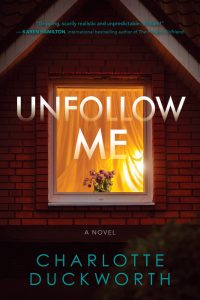
Charlotte Duckworth, Unfollow Me (Crooked Lane)
Charlotte Duckworth’s timely new psychological thriller promises to delve into the dark side of internet fame. When a popular mom-blogger-turned-influencer and her many accounts vanish overnight, it’s up to her devoted (some might say “obsessed”) fans to uncover the truth.—MO
Helen Monks Takhar, Precious You (Random House)
Okay, so we work at an online magazine, and we like to read books about other people at magazines. That doesn’t mean that murder mysteries about people working at magazines aren’t also very good, and Precious You promises to be one of the best! Generations clash when a millennial intern with ideas of her own gets hired to work under an old-school editor. Is the intern trying to replace the editor, or is the editor just jealous of the intern’s youth? You’ll have to read it (and so will we) to find out.—MO
Clarissa Goenawan, The Perfect World of Miwako Sumida (Soho)
From Singapore’s Clarissa Goenawan, whose novel Rainbirds garnered much critical acclaim, comes a new mystery set in Japan. A young woman appears to have committed suicide after hiding out in the mountains, but what, or whom, was she hiding from? Her friends are determined to find out what their friend was hiding behind her blunt facade.—MO
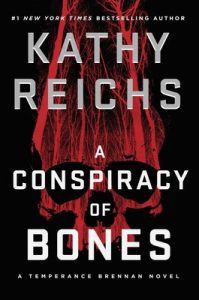
Kathy Reichs, A Conspiracy of Bones (Scribner)
Forensic anthropologist Temperance Brennan is at it again, it being crime solving. Faced with an unidentified corpse missing its face, Brennan is pushed to try and figure out who the dead is, and why this unfortunate person has Brennan’s phone number. Still recovering from an aneurism, Brennan must also battle migraines, nightmares, and hallucinations—at least she thinks that’s what they are.—LL
Maxine Mei-Fung Chung, The Eighth Girl (William Morrow)
Alexa Wu is not who you think she is: she has alternate personalities she cannot control. Only her stepmother, her shrink, and her best friend, the mysterious Ella, know about her condition. When Alexa gets a job at a high-toned gentleman’s club in London, she is drawn into a dark world where she comes close to discovering Ella’s secrets. But Alexa must keep it together in trying circumstances if she is going to help her friend and stay intact.—LL
Amy Engel, The Familiar Dark (Dutton)
In this heart-rending tale of motherhood and murder, Amy Engel takes us into the heart of the Ozarks, where the murder of two 12-year-old girls on a playground will have wide repercussions for their community and their town. The Familiar Dark promises to be a gripping new novel about the lengths to which we go for family.—MO
Jo Jakeman, Safe House (Berkley)
In an auspicious beginning to a psychological thriller, a woman calling herself Charlie Miller has just bought a rundown cottage in a remote seaside village. Charlie keeps herself to herself, as the Brits say, but her neighbors are curious. Charlie’s secret: she has just been released from prison for providing a false alibi for her murderer boyfriend. Even in the village where she longs for a fresh start, Charlie can’t help but feel like someone is watching her, and that someone knows her secrets.—LL
Kirsten Alexander, Lost Boy Found (Grand Central Publishing)
Based on the real case of Bobby Dunbar’s mysterious disappearance in 1912, Alexander’s debut is one of the endless permutations on a plot I always think of as the Martin Guerre, where a person who has been missing returns and his family and friends have to decide if this new person is actually the loved one they lost. In this case the boy, Sonny Davenport, disappears in the woods and is found two years later in the company of a tramp (a hobo, not a loose woman). But another woman besides Sonny’s parents lays claim to the boy, and the kidnapping trial that ensues reveals that the truth is far from simple.—LL
Columbus Noir, edited by Andrew Welsh-Huggins (Akashic)
Like the rest of the state of Ohio, Columbus has been hit hard by the opioid crisis, and the stories included in Akashic’s ode to the city are as full of misery as the city currently is in real life. Moments of humanity shine through in many of the tales in this collection, and epic takes on pride and greed make many of the stories in this collection go beyond small miseries into the realm of Shakespearian tragedy. Urgent, beautiful, and not to be missed.—MO
April
Sara Sligar, Take Me Apart (MCD)
I’m a huge fan of art world mysteries, as well as archival research, but this story should appeal to all fans of psychological thrillers. In Sligar’s confident debut, an out-of-work journalist takes on a job cataloguing the effects of feminist artist who died under mysterious circumstances. Hired by the artist’s brooding son, Sligar’s protagonist is not content to merely catalogue, and soon begins her own investigation into the artist’s demise, even as she finds herself falling for her current employer.—MO
Gabino Iglesias, Both Sides: An Anthology of Border Noir (Agora)
As a writer and critic, Gabino Iglesias is transforming the landscape of lantinx crime fiction, and with his new anthology of border noir, Iglesias adds editing to the mix. Both Sides promises to tell the stories of the unique culture that exists along the border, where cultures intermingle, and lines on a map fail to deter people from making common ground. A necessary addition to a growing genre.—MO
John Sandford, Masked Prey (Putnam)
Sandford’s latest twisty thriller featuring series character Lucas Davenport has the Minneapolis cop investigating a mean-spirited website filled with alarmingly intimate photos of politicians’ children. The FBI is stumped, and it’s up to Davenport to bring all his technical know-how to bear in discovering the culprit behind the blog. Masked Prey promises to be one of the best action thrillers of the year, and another solid contribution to Sandford’s growing body of work.
Streets of Paris, Streets of Murder: The Complete Graphic Noir of Manchette & Tardi (Fantagraphics)
Famed French crime writer Jean-Patrick Manchette and his mononymed countryman, Tardi, teamed up to write some of the bleakest and most beautiful noir imaginable, and now we get to read it thanks to a new edition from famed alternative comics publisher Fantagraphics. Noir has always lent itself to the visual, and comics have increasingly lent themselves to the telling of noir, but never in a single volume have the affinities felt so clear.—MO
Deon Meyer, The Last Hunt (Atlantic)
The indefatigable detective duo of Benny Griessel and Vaughn Cupido has returned in this latest blockbuster adventure from Deon Meyer. This time, the two officers of South Africa’s Hawks elite police unit find themselves investigating a cold case: the murder of a police officer. To solve this, they must ride the world’s most opulent train ride—and hope to receive help from two travelers, who seem to have disappeared. You’ll enjoy the suspense and thrills of this runaway train of a mystery.—OR
Mindy Mejia, Strike Me Down (Atria)
Mindy Mejia takes the old adage “follow the money” to heart in her new tale of financial crimes. Strike Me Down’s protagonist may have picked a safe profession, but as a forensic accountant, she’s prepared to risk it all to get to the bottom of some very tricky thievery. Also, there’s kickboxing!
Parker Bilal, The Divinities (Trafalgar Square)
Parker Bilal, the pen name of Jamal Mahjoub, has already won much renown for his Makana detective series, featuring a Sudanese sleuth exiled to Cairo, and we’re psyched to see that Bilal is launching a new series. The Divinities follows Londoners Dr. Rayhana Crane and Detective Sergeant Calil Drake as they investigate a high-profile crime tied to a never-ending war.—MO
Marcia Clark, Final Judgement (T&M)
From bestselling author and former prosecutor Marcia Clark comes a new tale of law and vengeance. Defense attorney Samantha Brinkman has a dangerous new lover, who also happens to be one of her clients—and he’s hell-bent on getting revenge. A twisty legal thriller with noir undertones, Clark’s latest is bound to please new readers and long-time fans alike.
Sheena Kamal, No Going Back (William Morrow)
In this third installment of her excellent Nora Watts series Kamal keeps the plot in the family. The daughter the troubled Watts gave up for adoption, Bonnie, now a teenager, has a powerful enemy: the rich and brutal Zhang family, who kidnapped her in a previous book. Dao, an enforcer for the triads who did private security for the Zhangs, is particularly bent on revenge. Watts must keep Bonnie safe, which means she must track down Dao, who is as wily as he is dangerous.—LL
Steven Wright, The Coyotes of Carthage (Ecco)
Dre Ross, a political consultant newly fallen-from-grace, has one last chance to redeem himself to his tough-as-nails employer —he’s headed to the backwoods of South Carolina to spend a quarter mill in dirty money convincing the suspicious residents to grant concessions to a mining company. As an African-American city slicker, he needs a buffer to convince the neighborhood to sell, so he enlists the help of a blue collar white couple with secrets of their own. While the land swindle is one of the quintessential stories of the noir canon, Steven Wright’s novel take makes the set-up all his own.—MO
Ian McGuire, The Abstainer (Random House)
In 1867 Manchester, revolution and murder will tear an Irish family apart, as one sides with the Fenians and the other works to take down the budding rebellion from the inside. Featuring rich detail and vividly drawn characters that perfectly embody their milieu, The Abstainer is essential reading for all fascinated by the intersection of crime and history. We can’t wait to dive into this brutal and beautiful noir.—MO
David Moloney, Barker House (Bloomsbury)
From a former department of corrections officer comes a powerful new novel of prison wardens, power struggles, and crushing compromises. Told from the perspective of two rookies, Barker House follows nine jailers through a single year. Some are sadists, some are voyeurs, but each has their own unique coping mechanisms to deal with the world of mass incarceration.
Stephanie Scott, What’s Left of Me Is Yours (Doubleday)
Singaporean British writer Stephanie Scott’s lush debut takes us into the shadowy world of Tokyo’s “wakaresaseya” industry, where specialists in the art of break ups help move along stalled divorce proceedings through a…wide variety of tactics. When a wakaresaseya is hired to sleep with a man’s wife and provide him justification to end the marriage, he doesn’t expect to instead, fall desperately in love. If the art of seduction is dangerous, then the struggle for love will prove even more so…I can’t wait to read this deep dive into obsession and jealousy, grounded in a truly weird industry.—MO
Samantha Downing, He Started It (Berkley)
It’s no secret that I was a big fan of Downing’s debut, My Lovely Wife, which delved into the secrets of a seriously twisted marriage. He Started It is about siblings—who happen to be grifters—on a road trip with their grandfather’s ashes in the trunk. They are going to scatter the remains of Grandad, but even in his present form he has a hold on his heirs, a car full of liars and cheats driving cross-country and checking out creepy Americana (a UFO watchtower, a reconstruction of the death of Bonnie and Clyde) along the way. It’s going to be a twisted ride.—LL
Jennifer Hillier, Little Secrets (Minotaur)
Canadian Hillier is a heck of a thriller writer, and for me, at least, her books are like potato chips: I read last year’s Jar of Hearts and couldn’t wait to gobble up her previous books, Creep, Freak and The Butcher. Little Secrets promises to be just as irresistible: golden couple Marin and Derek both run successful businesses and still find time to dote on their son, Sebastian. When Sebastian is taken, however, their marriage hits the skids. Marin lost one of the people dearest to her, and she’s prepared to go to drastic measures to make sure she doesn’t lose her cheating husband too.—LL
Sara Paretsky, Dead Land (William Morrow)
The great V.I. Warshawski is back, bitches. That’s right: Sara Paretsky’s legendary detective returns in her twentieth installment. This time, she’s pulled into a mystery involving sinister land developers when her impulsive goddaughter tries to help a destitute celebrity. But thankfully, Chicago’s touchiest PI is on the case.—OR
Janelle Brown, Pretty Things (Random House)
There are universal truths about crime fiction, one of which is that any story about people doing nefarious things becomes approximately a thousand times more interesting when those people are related. That same story becomes ten thousand times more interesting than that if it’s a family of grifters. In Brown’s novel, Nina, raised by a con artist mother, and her Irish boyfriend, Lachlan, target an heiress with a broken heart and a very big house. But Nina and Vanessa have a past which is about to catch up to them and change everything.—LL
Sara Blaedel, The Third Sister (Grand Central)
In this conclusion to her Family Secrets trilogy, Sara Blaedel returns to the story of Ilka Jensen, who has inherited a funeral home and discovered a family she never knew existed. Now she must try to track down her father, a man she always assumed was dead, and who she feels has no excuse for remaining absent from her life from so long.—OR
Darcey Bell, Something She’s Not Telling Us (Harper)
No one writes frenemies like Darcey Bell, whose clever debut, A Simple Favor, took the crime world by storm. Her latest takes us into the cutthroat world of parenting. Charlotte has a perfect life and a perfect child—until her brother’s new girlfriend begins to suspect something’s off with Charlotte’s obsessive parenting.
Cara Black, Three Hours in Paris (Soho)
From the author of the Aimee Leduc series comes a new standalone work of historical fiction set in the dark days of 1940. In what feels like an ode to the original British version of The Man Who Knew Too Much, an expert American markswoman is sent to France to try to assassinate Hitler. A cat and mouse game ensues through the blacked-out streets of occupied Paris, for what promises to be a work of fiction as thrilling as it is well-researched.—MO
Don Winslow, Broken: Six Short Novels (William Morrow)
I love a short novel: I admire the economical building of characters, setting, and plot. The prospect of six short novels from Poet Laureate of the US-Mexican border Don Winslow is exciting. Winslow has proven he can handle labyrinthine plots and juggle many characters in his expansive, complex Border Trilogy. Let’s see what he can do with the fat trimmed.—LL

True Crime Spotlight
Victoria Zackheim, Private Investigations: Mystery Writers on the Secrets, Riddles, and Wonders in their Lives (Seal)
Zackheim’s anthology is high-concept fare: in it 20 mystery writers contribute essays about a mystery in their own lives. Caroline Levitt recalls a time when she lost her voice and her doctors were stumped, unable to find a cure. Hallie Ephron tells a ghost story, and Kristen Lepionka grapples with a super creepy basement. Other contributors include Steph Cha, Rhys Bowen, Jeffrey Deaver, and Anne Perry.—LL
True Crime Spotlight
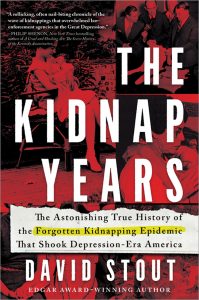
David Stout, The Kidnap Years : The Astonishing True History of the Forgotten Kidnapping Epidemic That Shook Depression-Era America (Sourcebooks)
I’m sorry, what? There was a what? So, apparently, there was a kidnapping phenomenon during the Great Depression—and in this fascinating and important book, Edgar Award-winning author David Stout recounts a horrifying and obscure chapter of American history, known only in popular cultural memory by its most famous case: the kidnapping of Charles Lindburgh’s baby son.—OR
May
Berkeley Noir, ed by Jerry Thompson and Owen Hill (Akashic)
My mom went to Berkeley in the 60s (my main tangential claim to hippiedom), so I’m psyched to see her favorite town get the Akashic noir treatment. San Francisco’s hippie silo has long captured the imagination of artists and writers, and I can’t wait to read the many stories in this collection, including new works from cult faves such Barry Gifford, Aya de Leon, Summer Brenner, and more.—MO
Jeffery Deaver, The Goodbye Man (Putnam)
Colter Shaw has returned—and this time, he’s pursuing two men who have allegedly committed a horrific hate crime. But as he hunts for them, he also winds up saving the life of a young woman, and this sets him on the trail of a mysterious organization. Is it a community bastion? Is it a cult? One thing is for sure: Shaw won’t rest until he hunts every single answer.—OR
Ivy Pochoda, These Women (Ecco)
In her last book, Wonder Valley, Pochoda presented her own distinct version of Los Angeles, populated by homeless people, middle-aged men in crisis, and a hippie commune in the desert. These Women looks like it also has indelible characters, this time in a neighborhood in south LA. They are all connected to the same man, and they are all in danger without knowing why.—LL

Melanie Abrams, Meadowlark (little a)
Everyone loves story of something rotten in paradise—hence all those marriage thrillers and suburban suspense. Set in a Utopian community, Meadowlark takes the concept further. A journalist takes her young daughter to visit an old friend who has founded a commune dedicating to letting children explore their “gifts.” What is the commune’s true philosophy, and why is it currently under criminal investigation? How can two victims of the same childhood traumas take such different paths in adulthood? We can’t wait to dive into this immersive, magical experience from a raw new talent.
Hye-young Pyun, Sora Kim-Russell, The Law of Lines (Arcade)
Hye-young Pyun established herself as one of the most original writers around with her hard-to-categorize novels Hole and City of Ash and Red, and her new novel promises to be just as mind-bending. In this slow-burn psychological thriller, a schoolteacher finds out her estranged half-sister is dead in a drowning that’s been labeled a suicide. Suspecting foul play, she heads to her sister’s university to dig up the truth.—MO
Abir Mukherjee, Death in the East (Pegasus)
Abir Mukherjee’s fourth in his Sam Wyndham series, set in 1920s India, has the opium-addicted captain seeking treatment at an ashram, where he comes across a familiar—and wholly unwelcome—face. Flashbacks to Wyndham’s days as a young constable in 1905 fill in the missing pieces as Wyndham recruits Sergeant Surrender-Not Bannerjee to reopen a long-unsolved investigation. This is one of my favorite historical series, and I’m excited to see to Sam Wyndham’s backstory explored a bit more in the new one.—MO
June
Patrick Hoffman, Clean Hands (Atlantic)
In this clever thriller by private detective turned crime writer Patrick Hoffman, ex-CIA officer Valencia Walker and corporate lawyer Elizabeth Carlyle must team up when Carlyle’s firm becomes the target of theft and blackmail, all leading to something must darker. As documents are slowly leaked to the press and tragic events begin happening, Walker and Carlyle know they do not have long to follow the paper trail and and catch a sinister agent of destruction. Also, this book has an excellent cover. Just saying.—OR
Sandy Jones, The Half-Sister (Minotaur)
Enjoy this new domestic suspense novel from New York Times bestselling author Sandie Jones. After reading this tale about a stranger arriving on the doorstep of a family’s home, you’ll never be able to go home again.
Susanna Lee, Detective in the Shadows: A Hard-Boiled History (Johns Hopkins Press)
Detective in the Shadows is a wide-ranging account of America’s fascination with the private detective, that figure steeped in moral ambiguity and fluent in the vernacular of both sides of the law. Lee analyzes the classics of hardboiled detective fiction, but also extends her arguments to recent TV shows like The Wire, Jessica Jones, and True Detective.—LL
Robyn Harding, The Swap (Gallery)
Harding, author of last year’s provocative The Arrangement, the story of a young woman who becomes involved with a sugar daddy, is one of the few crime writers who successfully integrates sex into her novels. The Swap is, yes, about couples who consensually trade partners. But the event is not just a drunken escapade: it upends their lives in ways they never could have imagined.—LL
Hakan Nesser, The Summer of Kim Novak (World Editions)
I love Nesser’s quirky and compelling Van Veeteren books, but it’s a treat to see him branch out in this novel set in the 1960s in rural Sweden. In Summer two boys, Erik and Edmund, have a collective crush on a teacher who resembles the actress Kim Novak. But this coming-of-age story veers into a mystery before too long, with Nesser’s trademark knack for suspense.—LL
True Crime Spotlight
Carlos Busqued, r. Samuel Rutter, Magnetized: Conversations with a Serial Killer (Catapult)
Magnetized is in the vein of recent true crime memoirs Visiting Hours by Amy Butcher and The Man in the Monster by Martha Elliott. Author Busqued starts visiting a serial killer, Ricardo Melgano, who at age 19 killed four taxi drivers in Buenos Aires. Now it’s 30 years later, and Busqued slowly coaxes the story of the murders and more out of Melgano.—LL
July
Halley Sutton, The Lady Upstairs (Putnam)
Halley Sutton’s pulse-pounding debut joins a host of recent works reinventing Los Angeles as a space for feminist noir. In The Lady Upstairs, a Hollywood con artist who earns her living blackmailing Hollywood’s worst men finds herself with more trouble than she bargained for when one of her targets ends up murdered. The only way out? Pull one more con.—MO
S. A. Cosby, Blacktop Wasteland (Flatiron)
Mechanic Beauregard “Bug” Montague is just trying to earn an honest living and do right by his young children, but he’s haunted by a past as one of the East Coast’s best getaway drivers. S. A. Cosby describes his debut as “a story that examines race and poverty and tragic ideals about masculinity through the prism of a Southern gothic heist novel,” and that, to me, sounds like the perfect noir.—MO
Unspeakable Acts: True Tales of Crime, Murder, Deceit and Obsession, edited by Sarah Weinman (Ecco)
This anthology of contemporary true-crime writing, edited by the incomparable Sarah Weinman, contains thirteen short pieces of high-caliber journalism that shook the culture and helped inspire today’s true-crime phenomenon. With pieces by Michelle Dean, Pamela Colloff, and with an introduction by Patrick Radden Keefe, this book will be sure to keep you rivetted.—OR


